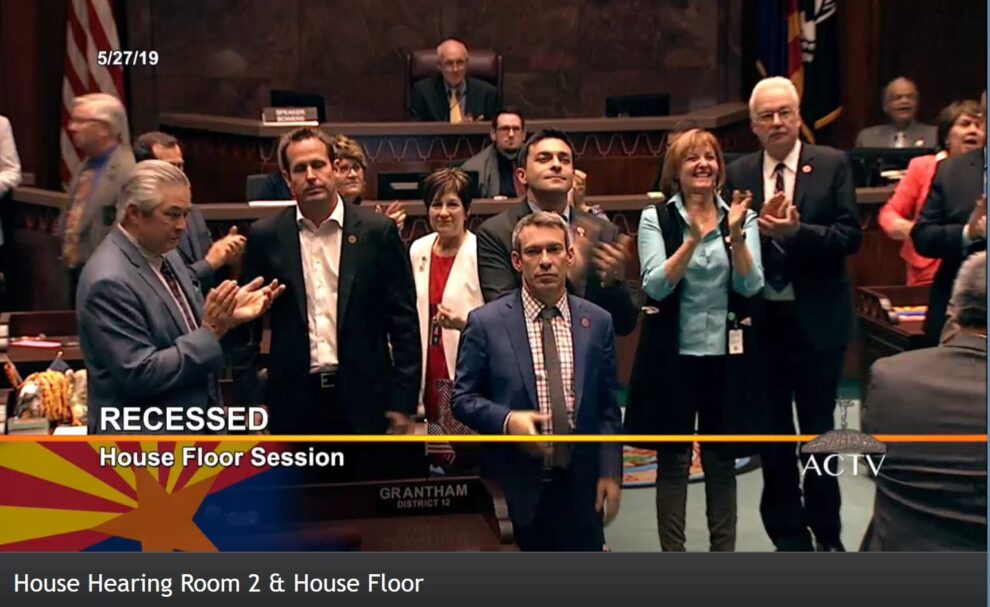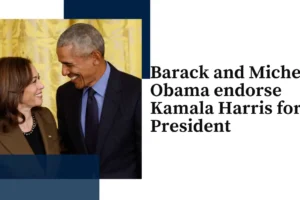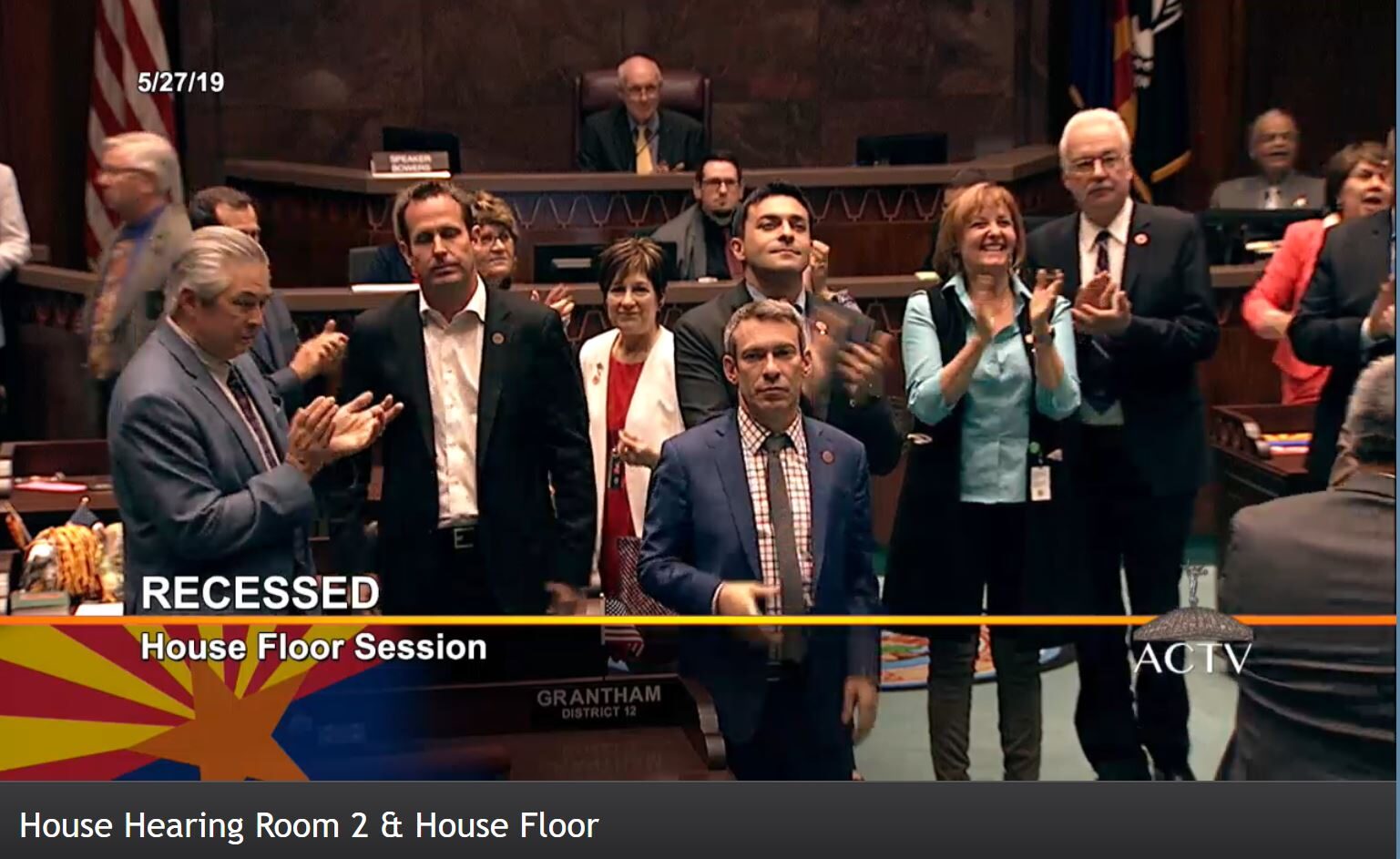
“Law makers passed a fiscally conservative, balanced budget that prepares for Arizona’s future and invests in the things that matter,” Gov Ducey said in a video released after he signed the budget bills. “Today I am proud to sign it. This is by far the best budget I have signed and such a contrast to where our state was just four years ago.”
The budget learns from the mistakes of the past and puts a downpayment on Arizona’s future, including fully funding teacher pay raises of 20 percent by 2020, adding over $700 million new dollars to public schools including new investments for school counselors, school resource officers, workforce programs and the Arizona Teachers Academy, Gov. Ducey said.
The budget “brings our Rainy Day fund to a record $1 billion, ensuring Arizona’s prepared for the future and doesn’t go on an irresponsible spending binge,” Gov. Ducey said.
Governor Doug Ducey video: Gov. Ducey signs #AZBalanced Budget
Updated May 30 & 29, 2019
Tuesday, May 28, 2019 – Legislature approves budget
8:44 a.m.
The Senate and House approves budget in rare Memorial Day floor sessions, transmitted the $11.8 billion budget to Gov. Doug Ducey and adjourned Sine Die at 12:58 a.m. on Tuesday, May 28, 2019.
We’re making good on our promises to invest in the things that matter like K-12 and higher education, public safety, health care and rural infrastructure – all while preparing our state for the unexpected and inevitable.
— Doug Ducey (@dougducey) May 28, 2019
There are 63 bills awaiting the governor’s signature. The governor has 10 days, excluding Sundays, after the Legislature adjourns sine die to sign them. That means by Saturday, June 8, all bills should be signed or vetoed. #AZLeg
— LegislationOnLineAZ (@LOLAArizona) May 29, 2019
It’s days like today that make all the hard work of legislating worth it. A huge shout out to Senators @PaulDBoyer and @HeatherCarterAZ for their leadership and courage to take this issue on and fight so hard to get it done. Proud to serve alongside you. https://t.co/qcaFX1OihY
— Sean Bowie (@seanbowie) May 28, 2019
The budget includes a tax conformity plan that lowers the tax rate and changes the child tax credit, standard and charitable contribution deductions, which will more than offset the 2019 increase, and Democratic Legislators called the tax conformity plan a $300 million-plus tax cut, according to an article in The Arizona Republic.
Budget summary: Rainy day fund deposit overshadowed by passing fiscally irresponsible $386 million permanent tax cuts instead of making new investments in public education and housing. AZ schools/students still waiting to get back to 2008 funding levels. #AZLeg
— AZ Economic Progress (@AzEconCenter) May 28, 2019
How the budget impacts K-12 education
Leigh Jensen, governmental relations associate with Arizona School Boards Association, said some of the highlights of the K-12 Budget Reconciliation Bill Provisions are:
- $165M pre-appropriated in Fiscal Year 2019 for an additional 5 percent teacher pay raise
- Appropriates $20M in FY20 to the School Safety Program and expands grant eligibility to include school counselors and school social workers
- Appropriates $136M in FY20 to restore cuts to District Additional Assistance
- Appropriates $30M in FY20 to increase Results Based Funding
- Appropriates $1M to ADE for Gifted Education
- Requires the School Facilities Board to fund new school construction based on enrollment projections indicating that additional space will be needed within the next two school years, rather than during the current school year
The Governor has 10 days, not including Sunday, to sign all of the budget bills and any other outstanding bills that made it to his desk, Jensen said. The general effective date for any bills not containing an emergency clause is August 27, 2019.
But, this budget on balance is something that AZ’s public school students will benefit from next school year.
— ASBA Gov Relations (@azsba_GR) May 28, 2019
Also important is the policy change to move back to 2 year projections for new school construction. That will help to relieve overcrowding in Arizona’s growing districts, and adds four new schools to this year’s planned construction.
— ASBA Gov Relations (@azsba_GR) May 28, 2019
“This year, the state made some movements in the right direction by funding several K-12 education initiatives, including giving schools more money to spend on new counselors, the next installment of the promised 20×2020 teacher raises, and increased funding to address our teacher shortage by training the next generation of educators. However, it is disheartening to see another tax cut of nearly $400 million when Arizona’s education spending remains among the lowest in the nation,” said Kathy Hoffman, Arizona Superintendent of Public Instruction in a press release this morning.
RT @AZHouseGOP: Our Republican budget invests over $6 Billion into education, which includes keeping our ongoing promise of teacher pay raises with #20×2020. #AZLeg pic.twitter.com/7oWzeecqCC
— Jeff Weninger (@JeffWeninger) May 28, 2019
“While the department received critical funds needed to begin upgrading our school finance payment system, currently running on outdated 1990’s technology, many of our budget requests were not granted. We were not given the spending authority for anywhere close to what is needed to manage the ESA program effectively and efficiently,” Hoffman said.
The money to support the ESA program would have directly supported ESA families with improved customer service and helped the Arizona Department of Education provide a smooth transition to the new ESA payment system, which will make it easier for families to appropriately spend their funds and cut back on cumbersome processes which currently leave too much room for error or misspending to occur, Hoffman said.
#AZleg had a chance to enact common sense charter reform. Our lawmakers failed to accomplish this bipartisan goal.
Charter reform would help good charters thrive. Northpoint Expeditionary Learning Academy is an example of just this. https://t.co/jIThmTHJGr
— Grand Canyon Inst. (@GrandCanyonInst) May 28, 2019
Hoffman noted that the Office of Indian Education, a statutorily mandated programa, remains unfunded, and that this budget places a strain on available federal matching funds to support Adult Education programs, which prepare individuals for the workforce.
“I have had the wonderful opportunity to travel the state, meeting with countless administrators, teachers, and students. These visits have made clear to me that we must return to pre-recession funding levels, with a sustainable, dedicated revenue source,” Hoffman said. “Next session, I look forward to fighting for this as well as for increased special education funding. I will also continue to advocate for more money to support the paraprofessionals and other school employees who play a vital role in educating our students.”
Graduation last Thursday, Teacher checkout last Friday….150 teachers and administrators are right back at it for @Humboldtunified Summer Institute! @MarzanoResearch #amazingteachers #summervacation pic.twitter.com/jIOUbjybJb
— Dan Streeter (@DanStreets9) May 28, 2019
“All students deserve access to a high-quality public education – no matter their zip code or their background. If the state cannot bring itself to fully fund education during a year with a massive budget surplus, when will it do so?” Hoffman said. “We must find the collective will to make this happen. Our future depends on it.”
Why the K-12 budget debate is important: We’re a year out from #RedForEd, teachers are still packed in the Senate gallery https://t.co/S3ao9xEgql
— Lily Altavena (@lilyalta) May 27, 2019
This includes base-level per-pupil funding formula, pupil transportation per mile amount, classroom site fund, Arizona State Retirement Service contribution rate for Fiscal Year 2020, and qualifying tax rate for schools, said Chuck Essigs, director of governmental relations for Arizona Association of School Business Officials.
The staff at the Arizona Department of Education and the Auditor General’s Office will be working hard to get budget forms out to districts and charters soon, Essigs said.
The state budget includes an increase of $30 million in the K-12 Results-Based Funding formula which brings Fiscal Year 2020 funding for the program to $68.6 million, $78.5 million for Building Renewal grants, $75.9 million for new schools and $30 million to eliminate the rollover for school districts with fewer than 1350 students starting starting in Fiscal Year 2022, Essigs said.
“Like all of the students in Arizona, my son has never had a fully funded education,” said Marisol Garcia, vice president of Arizona Education Association in a press release. “The state has money that can be used to restore the funding that has been cut from our schools, but lawmakers chose to fund tax cuts over Arizona’s students.”
The nearly $400 million in new permanent tax breaks, further reduces money available to fund public education, and the $30 million increase in . results-based funding sends more money to schools in affluent neighborhoods and raises the stakes of standardized testing.
“This program threatens our students’ ability to learn and grow by creating another persistent systemic funding inequity for our schools,” Garcia said. “The state should direct that money towards restoring all school funding.”
For the past two weeks, hundreds of teachers wearing #RedForEd have listened to discussions about the budget bills from the House and Senate galleries, advocated for resources students need and let lawmakers know about a student or colleague whose needs are not being met by the state’s budget.
“As educators, our students are our number one priority,” Garcia said. “We are used to rolling up our sleeves and taking responsibility for their educational needs. As a parent, I will do what I can to ensure my child gets the public education he deserves. And as a voter, I know I have a responsibility to hold my elected officials responsible, and I can vote for representatives and initiatives that I support. Together, the educators, parents, and voters know that we have the power to do what lawmakers have failed to do, and that is fund our schools.”
The final AZ FY20 budget includes investments in all of education. However, significant additional resources are needed to adequately fund the investment priorities outlined in the Roadmap for P-20 Education Funding. Learn more: https://t.co/PeMfTpnPoA #Road2Equity #AZProgress
— ExpectMoreAZ (@ExpectMoreAZ) May 28, 2019
Arizona State University President Michael Crow thanked Gov. Doug Ducey and Arizona Legislators for a one-time investment in higher education in the budget.
Here’s my statement on the passage of the FY20 state budget. https://t.co/6Mx5OEEJZm pic.twitter.com/3YhOZmqa0e
— Michael Crow (@michaelcrow) May 28, 2019
“We respect that passing the state budget is an exercise in managing competing priorities that involves give and take,” Crow said in a statement on ASU’s website.
“While we will continue to advocate for a reliable annual funding formula for resident students attending Arizona’s public universities because we believe that is the right way to manage this important state asset, we thank Governor Ducey and legislative leadership for the one-time, $35 million FY 2020 investment in higher education,” Crow said.
Crow also noted that ASU has already made an institutional commitment to fund the Arizona Teachers Academy and “welcomes the state’s investment of $15 million to help develop the depth and breadth of teachers that Arizona families need in this vitally important profession. It is a wise and meaningful use of state revenue that will provide a return on investment over the years ahead.”
“Our enthusiasm about progress on these fronts is dampened, however, by the legislature’s continued practice of sweeping millions of tuition dollars to subsidize the health plan for state employees,” Crow said. “The idea of using student tuition money to bolster funding for health insurance for workers employed by the state defies explanation and the university strongly objects to this tactic.”
Crow said that Arizona State University will continue its efforts on all fronts, leveraging all of its assets to their maximum, to ensure that every student who desires and qualifies for a college education is included.
“While the investment from the state of Arizona has, over the past decade and longer, become a smaller percentage of what is required to fund students from Arizona attending public universities, it is nevertheless a very important part,” Crow said. “We thank state leaders for their commitment in this year’s budget, and we look forward to continuing to work with the Governor, legislators and the Arizona Board of Regents to deliver the highest quality of education at an affordable and accessible price point.”
The Maricopa County Community College District appreciates the Arizona State Legislature’s and Governor Ducey’s support for improving educational attainment and workforce development opportunities throughout Arizona, said Maria Harper-Marinick, chancellor of the Maricopa County Community College District.
“This budget is a much-needed investment in community colleges that will enhance the accessibility of a high-quality college education and contribute to the success of the students and communities we serve,” Harper-Marinick said.
The Arizona FY20 State Budget includes a much-needed investment in community colleges. We thank Governor @DougDucey and the #AZLeg for their commitment to improving educational attainment throughout Arizona. Read my full statement: https://t.co/Riz4DLPecS #ThingsThatMatterAZ pic.twitter.com/fWymuaypfI
— Maria Harper-Marinick (@MariaHMarinick) May 29, 2019
Highlights of the budget include:
- $4.8 million to MCCCD and $1.2 million to Pima Community College, over three years, for workforce development and STEM formula funding
- $5.8 million to MCCCD for health care specialty expansion
- $15 million to Pima Community College for aviation program
- $14.2 million for rural community colleges
- $15 million for community college post-baccalaureate teaching students through the Arizona Teachers Academy (to be shared with Universities).
“The budget addresses the strategic priorities of the Maricopa Community Colleges, including STEM and healthcare training programs that are in high demand and continue to grow. We are pleased Gov. Ducey and our legislators support the largest provider of workforce training in the state that will help our community transform educational opportunities into long-term success,” Harper-Marinick said. “We look forward to the continued collaboration with our state leaders in advancing the local economy and higher education for all.”
12:30 a.m. on Tuesday, May 28, 2019
At 12:08 a.m. on Tuesday, May 28, 2019, the House approved adjourning Sine Die.
We have adjourned, Sine Die!
@WaltBlackmanAZ @KelliButlerAZ @Jennifer_Pawlik @Bolick4AZ @JoanneOsborne8 pic.twitter.com/V2NyDxuEmc— Rep. Kelly Townsend (@KellyTownsend11) May 28, 2019
At 12:43 a.m., Senate President Karen Fann thanked all the staff, interns, pages as she explained her vote during the final reading of bills.
At 12:52 a.m., the Senate adjourned Sine Die.
Instead of considering a motion to reconsider HB2618, @votewarren made a substitute motion to adjourn sine die. It was approved.
The House is just a few procedural hurdles away from officially wrapping up. #azleg
— Ben Giles (@ben_giles) May 28, 2019
In the Senate, President @FannKfann says we’re still waiting for a couple final bills to be engrossed before the Senate can adjourn sine die. #azleg
— Julia Shumway (@JMShumway) May 28, 2019
A few House members have made it over to the Senate floor, where everyone is confused about what the House is doing and assorted senators keep running in and out of the president’s office.
— Julia Shumway (@JMShumway) May 28, 2019
Senate’s going to recess while waiting for a couple bills from the House, then we’ll sine die. #azleg
— Julia Shumway (@JMShumway) May 28, 2019
House was about to vote on a “trailer” bill to the budget that adds a variety of new spending here or there. But Rep. Steve Pierce made a motion to adjourn sine die to raucous applause before that could happen.
We’ll see if that motion succeeds… #azleg
— Ben Giles (@ben_giles) May 28, 2019
House was about to vote on a “trailer” bill to the budget that adds a variety of new spending here or there. But Rep. Steve Pierce made a motion to adjourn sine die to raucous applause before that could happen.
We’ll see if that motion succeeds… #azleg
— Ben Giles (@ben_giles) May 28, 2019
The House just dunked on the Senate’s budget “trailer bill” — hard. 7-53. #azleg #SineDie here we come!
— Arizona House Democrats (@AZHouseDems) May 28, 2019
Monday, May 27, 2019
10:17 p.m.
The Senate passed the budget bills today as the House voted on other bills in a rare Memorial Day session.
The Senate also approved House Bill 2466, which gives victims of childhood sexual assault until the age of 30 to file civil claims against their abusers. This, along with the amendments adopted in the House, allowed the Senate to approve Senate Bill 1551 by a vote of 17-12.
Both the House and the Senate are now working to pass the few remaining bills and will likely Sine Die tonight, said Leigh Jensen, governmental relations analyst with Arizona School Boards Association.
At 11:45 p.m., the Senate recessed to wait on some bills from the House before they got ready to end the legislative session.
For newcomers to the #azleg, this tradition dates back a couple of decades. When the ice cream arrives in the member’s lounge, it means sine die is imminent. https://t.co/wuXnXvC9qZ
— Jim Small (@JimSmall) May 28, 2019
Senators and staff are now wandering around eating ice cream bars while a few remaining lobbyists are up in the gallery talking about how much they disliked the end of Game of Thrones. The end is nigh, right? #azleg
— Julia Shumway (@JMShumway) May 28, 2019
Senator @SylviaAllenAZ is enjoying some ice cream before we get back on the floor tonight to finish up the budget. #AZSenate #Budget #AZ #AZLeg pic.twitter.com/pTtBNus4f9
— AZSenateRepublicans (@AZSenateGOP) May 28, 2019
For 134 days of session, 59 representatives had access to the speaker’s dais. One did not: @JenLongdon, who uses a wheelchair.
Lawmakers gave her a boost on the last night of voting. #azleg pic.twitter.com/Q10GVDqXic
— Ben Giles (@ben_giles) May 28, 2019
7:59 p.m.
Sen. Tony Navarrete voted against House Bill 2747, saying Arizona ranks at the bottom in teacher pay because the state hasn’t fully funded education in years.
State Republicans have approved an $11.8 billion Arizona budget. It now heads to the governor’s desk. What’s getting more funding and what is getting eliminated: https://t.co/jfq704uMcE pic.twitter.com/tmdczMwqwa
— azfamily 3TV CBS 5 (@azfamily) May 28, 2019
“Our refusal to invest in families is why I vote no,” said Sen. Rebecca Rios as she explained her vote on the bill.
Sen. Sylvia Allen said the budget process has become “a feeding frenzy and focus on how many problems we can solve.”
“There just comes a limit when we run out of money,” Sen. Allen said as she voted yes on the bill.
“A bipartisan budget is not a budget that has one or two Democratic votes on the board,” said Sen. Martin Quezada.”Bipartisanship is a process, it’s not an end result. This as an important bill to consider this on.”
I long for the day educators in the gallery are brought to their feet after we pass a budget that respects their profession and the students they serve. #AEABudgetWatch https://t.co/5rjCAtk703
— Sen. Martín Quezada (@SenQuezada29) May 28, 2019
“We could have put money into district additional assistance instead of results based funding. We could have put funding into full-day K instead of the rainy day fund or tax cuts,” Sen. Quezada said.
“If you are disappointed in the results on the board, it’s probably because the process wasn’t good. I vote no,” Sen. Quezada said.
Sen. David Livingston said when you look at investment returns you look at one year, five year or 10 year returns, but some members like to keep going back to 2008.
“Why? Because it was an all time high. If you keep using that you are doing a disservice. If you want to look at last year’s budget there’s an 11% increase and then we can have a fair debate,” Sen. Livingston said.
We appreciate @SylviaAllenAZ for explaining why Results Based Funding is so impactful. This budget expands the program by making even more low-income schools eligible. Large and small, urban and rural. This is an excellent budget and deserves bipartisan support.
— Arizona Chamber (@AZChamber) May 27, 2019
“We had many members on both sides that had no asks in the budget,” said Sen. Vince Leach.
“Some of us don’t get what we ask, but you were at the table. I think this budget goes a long way to touch buttons on both sides of the aisle.” Sen. Leach said.
Official freshman pictures! 😆 You know just waiting on the #AZSenate to get it together so we can #SineDie pic.twitter.com/Jcpx3t0qBE
— (((Alma Hernandez))) (@almaforarizona) May 28, 2019
The Senate approved House Bill 2747 with 16 ayes and 13 nays and 1 not voting.
Then the Senate voted on House Bill 2749 the K-12 education portion of the budget bills. The bill was approved with 17 voting aye, 12 voting nay and 1 not voting.
Sen. Quezada said, “I represent a group of people who believe education is the great equalizer and the ladder out of poverty.”
But results-based funding is not equitable, Sen. Quezada said.
“The $64 million going for results-based funding would have been enough to provide raises for school support staff this year,” Sen. Quezada said.
Sen. Quezada said the Arizona Legislature put more towards district additional assistance, but could have done more.
“The need for our school counselors is a lot more than the $15 million in our budget,” Sen. Quezada said. “Our student to counselor ratio is the worst in the nation.”
A sea of teachers on their feet, hands in the air when @SenQuezada29 talks school safety and counselors.
Want to stop the school-to-prison pipeline? Fund school counselors.#50thInTheNation @AzSCA pic.twitter.com/CznxNa10Rq
— Julie Gunnigle (@JulieGunnigle) May 28, 2019
Three days after the House approved an $11.8 billion spending plan negotiated with Gov. Doug Ducey, the Senate caught up and approved it, too. via @ben_giles and @JMShumway https://t.co/YzqmenO98L
— AZ Capitol Times (@AzCapitolTimes) May 28, 2019
Happy 134th day at the #AZLeg do y’all think we will actually #SineDie today?! We are only 34 days late. Rumor has it those in the gallery are providing the->🍨 🤷🏽♀️ pic.twitter.com/FvEkReBUtg
— (((Alma Hernandez))) (@almaforarizona) May 28, 2019
“Reverse Caucus” ! A Sine Die tradition. The staff try to ask the reps tough questions, and the reps try to answer like staff does.Faves: “Were the tribes consulted?”
“I’ll have to get back to you on that.” 😉 https://t.co/01Fbl7Kaf3
— Mitzi Epstein (@MitziEpstein) May 28, 2019
Saturday, May 26, 2019
6:33 p.m.
The Senate has reached a tentative deal that would make it possible for Senators to pass a revised version of the House budget approved on Saturday when the Legislature is in session tomorrow on Memorial Day.
Prayer works and today prayers were answered. We have a deal that balances protecting victims and the innocent. Likely we wrap up soon. #AzBudget
— Warren Petersen (@votewarren) May 26, 2019
The Senate session starts at 11 a.m.
The House session starts at 10 a.m.
Republican Sen. Paul Boyer and Democratic Senate Minority Leader David Bradley confirmed the tenative deal on Sunday in the late afternoon, according to an Associated Press article.
The #AZBudget is still changing. We Democrats are pushing for improvements to assure it is both Adequate and Fair.
When we voted Friday-Saturday we knew the budget was not good enough and still has more negotiations to be done.
— Mitzi Epstein (@MitziEpstein) May 26, 2019
The tentative deal hinges on extending the statute of limitations on how long victims have to sue child predators to age 30 and allows victims now blocked from suing to do so until December 2020, said Sen. David Bradley in The Associated Press article.
Lengthening the statute of limitations for child victims appears to be the only way the Senate will be able to pass a budget, as Senate Democrats joined Boyer and Republican Sen. Heather Carter in saying it needed to come first. https://t.co/szJom7Vx9O
— Julia Shumway (@JMShumway) May 27, 2019
Saturday, May 25, 2019
4:33 p.m.
The House approved the budget shortly before 5 a.m. on Saturday morning, but the Senate resumed its floor session Saturday with little indication that a budget deal could be reached soon.
How in good conscience could anyone who cares about public ed in AZ vote no for a budget that adds over $500 mil NEW $$$’s and raises per pupil spending to all time highs? Proud to stand with the 31 Republicans at 0445 in the morning who got this done. #azleg #AzBudget #azgop pic.twitter.com/bGGlf221Xq
— Travis Grantham (@TravisGrantham) May 25, 2019
House Democrats oppose unsustainable GOP budget; House passed $386 million tax cut instead of fully funding education, infrastructure & affordable housing. #AzBudget #azleg pic.twitter.com/xrN9yXSeSf
— Arizona House Democrats (@AZHouseDems) May 25, 2019
Senate President Karen Fann tried to move forward with parts of the $11.8 billion budget deal that are non-controversial, according to an Associated Press article.
Senate begins a rare Saturday session then immediately goes in recess. #AzLeg pic.twitter.com/kNVQiVx3ut
— Dennis Welch (@dennis_welch) May 25, 2019
Three Republican Senators have said they will vote against the budget bills unless their needs are met.
The slim 17-13 Republican majority in the Senate and no Democratic support for the budget means that one or more of the holdouts must be persuaded to approve the budget.
The governor’s office has been negotiating with Fann, and two senators in an effort to address the time frame on the sex assault issue, Ducey Chief of Staff Daniel Scarpinato said to The Associated Press.
Sadly, I had to miss my students’ high school graduation as I’m still here on the Senate Floor ready to protect children from sexual assault, provide more money for schools, and pass this budget! Meanwhile, grading papers on a Saturday. #TeacherLife pic.twitter.com/Ogux1VwMPI
— Paul Boyer (@PaulDBoyer) May 25, 2019
The lack of coordination between the House and the Senate is unusual, because they usually approve budget bills together, once they’re sure they have enough votes to pass them, according to an article in The Arizona Republic.
The Senate will take Sunday off and then return to work on Memorial Day. The House will meet on Memorial Day also.
#AEABugetUpdate Saturday 4:35 pm. All day today #RedForEd activists have been filling the galleries. This is just the group we caught at 4 pm. There are educators here all the way from Vail, Payson, Marana, Tucson, all over the State. pic.twitter.com/qioYI0pPjl
— Marisol Garcia (@marisolgarciaaz) May 25, 2019
3:04 a.m.
House lawmakers worked into the morning Saturday to discuss, propose floor amendments and pass several budget bills.
.@Jennifer_Pawlik introduces #AZBudget amendments to fully restore district & charter funds cut from our #publicschools. Another would fund salary increases for ed support personnel. Great ideas- sad they were not accepted on the bill. #azleg pic.twitter.com/Bn7dXQUeMX
— Kelli Butler (@KelliButlerAZ) May 25, 2019
Right now, they are on budget bill House Bill 2747.
Rep. @aaron4az fighting for certified school employee pay raises ($72m) and $84m to help working families with childcare assistance. GOP is a big no. #azbudget #azleg pic.twitter.com/qavArcX641
— Arizona House Democrats (@AZHouseDems) May 25, 2019
Rep. Rusty Bowers described an amendment that would provide a list of parent complaints of teachers wearing red or sharing political viewpoints in the classroom to be forwarded to the legislature and the attorney general.
“This just seems like a way to threaten and harass teachers on campus. We saw a bill like this earlier in the session,” said Rep. Kelli Butler about Rep. Rusty Bowers amendment to an amendment. “This is really troubling. This sets up a very poorly designed process to harass people.”
Rep. Dr. Regina Cobb pointed out that the report would be a public document after questioning Rep. Bowers who pointed out that if there were no complaints there would be no report.
A hybrid of Rep. Kelly Townsend’s teacher retribution bill has been snuck into the budget. @KelliButlerAZ questions Speaker Bowers about provision which requires complaints be forwarded to him & Senate President.
“This is harassment and retaliation against teachers.” #REDforED pic.twitter.com/b1aPEFqIYd— Arizona House Democrats (@AZHouseDems) May 25, 2019
“We simply should not be making $5m payment to a private corporation like this.” Amendment by @Diego4Justice strikes a 10% pay increase for private prison correctional officers. Unfortunately not adopted. #AzBudget #azleg pic.twitter.com/5etXIbnRDY
— Arizona House Democrats (@AZHouseDems) May 25, 2019
Rep. Arlando Teller said he feels like representatives presenting amendments are not being heard and the amendments are not being considered at 2:16 a.m.during the early morning floor session.
Battling for one of her caucus’ top priorities, teacher & Rep. @Jennifer_Pawlik requests $200m for schools to replace outdated textbooks, software and other classroom materials. Also pushes for $220m for school support staff raises. Republicans say no. #azleg #AZbudget #RedForEd pic.twitter.com/QSddfKrlwJ
— Arizona House Democrats (@AZHouseDems) May 25, 2019
“What we’ve seen over the last couple of hours over 20 Democratic amendment not even considered because of the party registraion of the representative giving the amendments,” said Rep. Cano. “But what we can do at 3 a.m. is pass these amendments to make sure majority members needs are met. I do not think this is fair.”
Gotta love it when the Minority party on one hand complains about the time of day during debate and then proceeds to argue and ask nonsensical questions, thus resulting in more time passing.
— T.J. Shope (@TJShopeforAZ) May 25, 2019
3/3 To top it off, the amount appropriated for the Presidential Preference Election is not even close to the $7M county election officials said they need to ensure the PPE runs smoothly. #AZLeg #AZBudget
— Secretary Katie Hobbs (@SecretaryHobbs) May 25, 2019
Sensing a theme here. Republicans say no to @Sierra4AZ amendment $7m this year and $21m by 2022 for early childhood education block grants. #azleg #AZBudget #RedForEd pic.twitter.com/odd4u6izbh
— Arizona House Democrats (@AZHouseDems) May 25, 2019
Rep. @JenLongdon requests state hire a statewide ADA coordinator and sexual assault service provider grants, as well as rape crisis centers. Unfortunately for Arizona not successful. #azleg #azbudget pic.twitter.com/I0NjYNpmpZ
— Arizona House Democrats (@AZHouseDems) May 25, 2019
On the Education Budget. Rep. @IselaBlancAZ argues to eliminate results-based funding for schools because it penalizes poorer and more ethnically diverse schools. Republicans vote no. #azleg #azbudget #RedForEd #hb2747 pic.twitter.com/h1jxsavK5G
— Arizona House Democrats (@AZHouseDems) May 25, 2019
Rep. @DrGerae Peten offers amendment to Ed Budget to ban for-profit charter schools. “Very few of these schools actually succeed. The for profit charter schools purpose is in their title. It’s for profit, not teaching, learning and student achievement.” #azleg #AzBudget #RedForEd pic.twitter.com/iJ95mrWMtz
— Arizona House Democrats (@AZHouseDems) May 25, 2019
May 24, 2019 11:49 p.m.
Teachers are hanging tough! #LD28 teachers are here to support their students-we’re all still waiting for the education budget to come to the #AZHouse floor. It’s 5:30pm on Friday…. #BudgetWatch pic.twitter.com/InLlt3QcYd
— Kelli Butler (@KelliButlerAZ) May 25, 2019
House Legislators have been moving budget and other bills throughout the day and evening after recessing sporadically for committees and caucuses.
Rep. @MitziEpstein speaks out against irresponsible & unsustainable Republican tax cuts while our schools and infrastructure that are still poorly funded. #AzBudget #RedForEd #azleg pic.twitter.com/x3fgN0pEdp
— Arizona House Democrats (@AZHouseDems) May 25, 2019
Rep. @CesarChavezAZ’s amendment grants in-state tuition for #DACA recipients. “These students are not asking for a dime from the state of Arizona, they are asking to go to school and to be successful.” Republicans reject. #azleg #azbudget pic.twitter.com/6monra5vdz
— Arizona House Democrats (@AZHouseDems) May 25, 2019
“It is extremely important that we allocate this money to make sure we get the best count possible for the state of Arizona.” Republicans reject @espinozadiego19 amendment for $10m to help ensure Arizona conducts an accurate census count. #AZBudget #azleg pic.twitter.com/NDfUZH2kP3
— Arizona House Democrats (@AZHouseDems) May 25, 2019
Reps. @Sierra4AZ and @espinozadiego19 strongly oppose bypassing rules to rename a peak in their district after Charles Keating IV. There are worthy veterans & heroes from their community who also deserve the honor. Their passion worked! #HB2315 goes down 15-45. #azleg pic.twitter.com/HHlY9pwuDb
— Arizona House Democrats (@AZHouseDems) May 25, 2019
The House recessed until 3 p.m. so the Rules Committee could meet at 2:30 p.m.
The House resumed its floor session earlier after being recessed until 1:30 p.m.
House Legislators approved a few bills when they returned to a floor session after recessing earlier at 10:45 a.m. Lawmakers passed a handful of bills earlier this morning as well.
See you tomorrow, folks. Lawmakers set to move a bill Saturday that essentially gives them a big raise by tripling their reimbursement rates during the session. pic.twitter.com/Q9mlwGzhJ8
— Dennis Welch (@dennis_welch) May 24, 2019
The Arizona Senate adjourned before 10 p.m. without voting on budget bills because it remains shy of the amount of Republican votes needed to pass the budget without support from Democratic Senators.
Arizona Senate adjourns without acting on budget. Still short of R votes. Holdout @PaulDBoyer says “no deal is in sight”. Senate President @FannKfann nevertheless tells members to return at 10 a.m. Saturday and “maybe we can start voting on some budget bills if at all possible.”
— Bob Christie (@APChristie) May 25, 2019
Senate President Karen Fann told members late Friday to return at 10 a.m. Saturday and that “maybe we can start voting on some budget bills if at all possible,” according to an Associated Press article.
The Senate met in floor session sporadically throughout Friday, recessing for committee meetings, caucuses and negotiations with Senators who have said they will not vote for the budget.
After a Committee of the Whole session started at 12:12 p.m. then recessed at 12:21.
The Senate floor session scheduled to begin at 10 a.m. instead started around 11:10 a.m., then recessed and Senators met in caucuses.
.@HeatherCarterAZ made only a brief appearance on the floor. She and @FarnsworthEddie came out of @FannKfann’s office to mark themselves present, then went back behind closed doors for whatever discussion they’re having. Neither was in caucus.
— Jeremy Duda (@jeremyduda) May 24, 2019
When they came back from recess after 1:30 p.m., House lawmakers approved House Bill 2360 with 58 ayes, 0 nays and 2 not voting.
Then, legislators in the House voted on House Bill 2501, which passed with 58 ayes, 0 nays and 2 not voting.
House lawmakers then approved House Bill 2646 with its emergency measure clause with 59 ayes, 0 nays and 1 not voting.
Rep. Arlando Teller said this bill will assist those in rural Arizona in connecting with internet broadband to the outside world.
Congratulations Rep. @ArlandoTeller whose bill #HB2646 was just unanimously sent to the Governor. Eligible applicants for the federal rural e-connectivity programs will be able to request the Commerce Authority review their applications for accuracy. #AZLeg pic.twitter.com/CGY7sOhA3E
— Arizona House Democrats (@AZHouseDems) May 24, 2019
There will be a Rules Committee hearing at 2:30. The Republican and Democratic Caucuses will meet immediately after the adjournment of Rules. The House is recessed until 3 p.m.
The Senate was supposed to start an hour ago, and the few lawmakers who’ve wandered on and off the floor have no idea what’s happening. pic.twitter.com/D0LXA5cE9H
— Julia Shumway (@JMShumway) May 24, 2019
The House approved Senate Bill 1485 with 60 ayes, 0 nays and 0 not voting.
Rep. Andres Cano said “We give out so many tax breaks in Arizona with no sunsets, that today individual and corporations have $1.54 B in tax credits.”
“We’ve been asking for this review of tax credits for years and the committee to do so has not met in three years,” Rep. Cano said.
“This bill is incremental progress and with that I vote aye,” Rep. Cano said.
We recessed after 2 a.m. Public transportation doesn’t run at that hour. Rolled home w/help of colleagues, staff & Ofc. Bryant of @phoenixpolice. What happens to workers who need early am transportation? That’s why I’m advocating for a budget that supports Arizona’s families.
— Jennifer Longdon (@JenLongdon) May 24, 2019
Rep. Pamela Powers Hannley said, “I think the Student Tuition Organizations have run its course and should go down to zero. I’m going to vote yes, because we’re getting it off 20 percent, but in my opinion it should be 0%.”
Rep. Randall Friese said, “Unfortunately we are phasing the Student Tuition Organization cap out, because we did not have the courage to eliminate it.” Rep. Friese voted yes.
Thank you for your support of the fiscally conservative budget!
Co-sign the budget here ➡️ https://t.co/u1f053MYNR #AZBalanced #AZInvests #ThingsThatMatterAZ pic.twitter.com/lgGIVj9PAa— Doug Ducey (@dougducey) May 24, 2019
After rising to honor Sen. John Pinto, a Navajo Code Talker who recently passed away with a moment of silence, the Senators recessed to go into Caucuses.
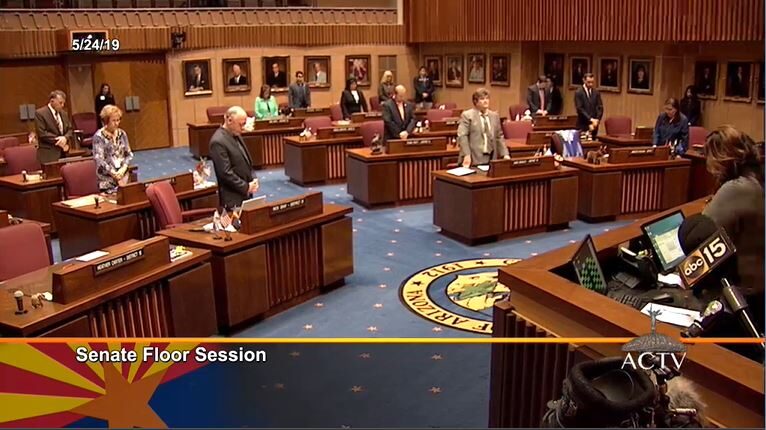
Arizona senators rise for a moment of silence for New Mexico Sen. and Dr. John Pinto, a Navajo Code Talker, who has passed away. Photo courtesy of Arizona Capitol Television.
It’s time to get back to work. The @AZHouseDems @AZLatinoLC are fighting for AZ families. #LD19 #RedForEd #azbudget #SineDie pic.twitter.com/M7MHDYj45v
— Rep. Lorenzo Sierra (@Sierra4AZ) May 24, 2019
10:36 a.m.
Legislators in the House of Representative approved House Bill 2566 with a vote of 56 ayes and 0 nays and three not voting, but as of 10:30 a.m. Senators had not begun their floor session.
Ready to start the day! #RedForEd back in the #AZHouse as we debate the funding for our students and schools ❤️🌟 #BudgetWatch #AZBudgetWatch #AZ pic.twitter.com/4rUD3bYjSk
— Kelli Butler (@KelliButlerAZ) May 24, 2019
Then Rep. Arlando Teller said he’d just received news this morning that New Mexico Sen. and Dr. John Pinto, a Navajo Code Talker, and requested a moment of silence in honor of Sen. and Dr. John Pinto.
John Pinto, a Navajo Code Talker and longtime New Mexico state senator, has died. He was 94: https://t.co/9ursu5t4n3 #abc15 pic.twitter.com/Y3RXss58XR
— ABC15 Arizona (@abc15) May 24, 2019
House Legislators passed HB 2670 with a vote of 59 ayes, 0 nays and 1 not voting.
Rep. Isela Blanc said she would be voting yes on the bill, but we really don’t need a study committee for what we already know. If we fully funded education then special education and gifted children would have their needs met.
“Stop giving tax cuts to the wealthy and start investing in the future – in Arizona’s economy and in our children,” Blanc said.
After standing for a moment of silence to honor New Mexico Sen. and Dr. John Pinto, a Navajo Code Talker, who recently passed away, members of the Arizona House of Representatives recessed until the sound of the gavel at 10:45 a.m.
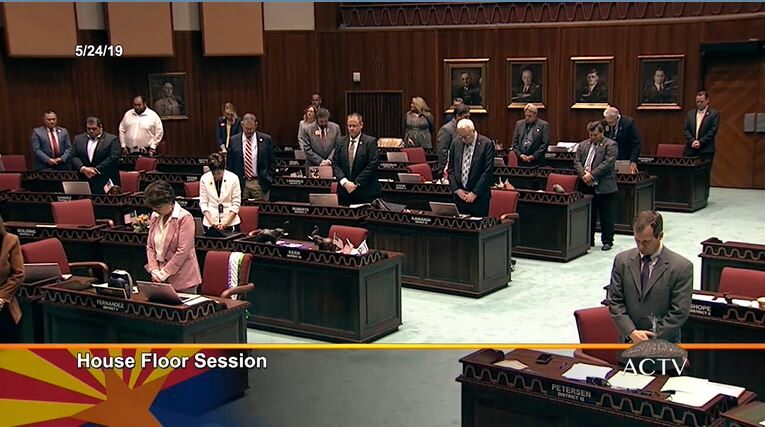
The House of Representatives rises in a moment of silence for New Mexico Sen. and Dr. John Pinto, a Navajo Code Talker, who has passed away. Photo courtesy of Arizona Capitol Television.
The Senate still has not begun it’s floor session.
8:55 a.m.
Legislators return to the House and Senate at 10 a.m. to continue discussion on budget bills and other legislation.
FRIDAY morning budget update – our House colleagues were at the capitol until 2am this morning, and we go back to the Senate floor at 10am. The budget is still short on votes – it should be another long day! #LD18 pic.twitter.com/0GckqXmxr3
— Sean Bowie (@seanbowie) May 24, 2019
There is support among a majority of Republicans in the House for the budget, but not enough GOP support for it in the Senate, according to an Associated Press article. Republicans have a 31 to 29 majority in the House.
Democrats who make up the minority in both the House and the Senate do not support the GOP plan.
.@dougducey wants his rainy day fund. This is inside a Valley school. It’s rainy…fund it!! #RedForEd #Red4Ed #FundOurSchools #REDStorm @ArizonaEA @AZHouseDems @AZSenateDems @AZSchoolsNow @azedschools @azdemparty @MaricopaDems pic.twitter.com/CA5gHi7liN
— Jeanne Casteen for Maricopa Co. School Supt (@Casteen4MCSupt)
In the Senate, the budget remains short on votes and this will be another long day, said Sen. Sean Bowie, who noted that this was the first time in three years he was at the Legislature on a Friday.
“We are always willing to sit down and work with colleagues on both sides of the aisle on our priorities in the state budget, which as you know are K-12 additional assistance, our state housing trust fund and more support and funding for our school counselors,” Sen. Bowie said.
Senators were told to be ready to be at the legislature to work on the budget on Saturday as well as Monday, which is Memorial Day.
It’s the 131st day of #Session, and it looks like a beautiful day to #SineDie.😀
We have a really busy day ahead of us, so stay tuned for more updates throughout the day…#AZSenate #Budget #AZ #AZLeg pic.twitter.com/7BceK04lUV
— AZSenateRepublicans (@AZSenateGOP) May 24, 2019
Republican senators who said they would vote against the budget bill delayed in Senate action on the budget on Thursday, and their positions were discussed by GOP House members during a closed evening caucus meeting whose comments were caught on a live microphone. Republicans in the Senate have a 17 to 13 majority.
Rep. Ben Toma, a Republican from Peoria, said there will be repercussions for Sen. Paul Boyer and Sen. Heather Carter, who are refusing to support the budget, and noted that he “is in no mood” to hear bills from them in the upcoming session, according to a 3 TV/ CBS 5 KPHO story.
BUSTED!: Republican lawmakers threatened retaliation against two of their colleagues who are pushing to protect childhood sex assault victims: https://t.co/4aCSW7zjrq
— Dennis Welch (@dennis_welch) May 24, 2019
Rep. Kelly Townsend, said lawmakers discussed filing an ethics complaint against the two senators before the part of the conversation caught on the recording and that she was trying to “soften” the conversation, according to an article in The Arizona Republic.
Arizona House Republicans were caught on a hot microphone on Thursday discussing how to penalize two of their colleagues for not going along with the state budget. https://t.co/UX9W4kNkaY
— azcentral (@azcentral) May 24, 2019
Sen. J. D. Mesnard does not support the tax break plan in the budget plan negotiated by Legislative leaders and Gov. Doug Ducey and has said he will not vote for it.
.@PaulDBoyer and @JDMesnard say they’re both “no” votes on the budget this morning. So unless at least one Dem is on the budget, they still don’t have 16, even if they flip @HeatherCarterAZ to a “yes.” https://t.co/WuZ6vjc6n7
— Jeremy Duda (@jeremyduda) May 24, 2019
The House adjourned shortly after 2 a.m. Friday after the GOP Caucus showed it supported the budget plan, said Rep. T. J. Shope in the Associated Press article.
Three budget bills on health and human services, the environment and criminal justice passed in the House without the votes of House Democratic legislators.
2:09 a.m.
After Legislators in the Arizona House of Representatives discussed budget bills and provided floor amendments into the early morning hours, the house recessed at 2:09 a.m. until 10 a.m.
It’s 2am and #AZHouse just adjourned. We’ll be back in 8 hours-Friday at 10am. All these teachers stayed with us all night, but House leaders didn’t put the education budget bills up for debate. #RedForEd #azleg #BudgetWatch pic.twitter.com/isY1ubwwOR
— Kelli Butler (@KelliButlerAZ) May 24, 2019
2:15 am, House adjourned with its inadequate GOP budget half done and #RedForEd is still going strong. #azleg #azbudget pic.twitter.com/ahW8Anq1mr
— Arizona House Democrats (@AZHouseDems) May 24, 2019
Look at all the incredible teachers and parents who’ve been on #BudgetWatch all day-and are ready to stay all night! So inspiring to know they’re here fighting for their students and our schools! ❤️ #RedForEd #azleg pic.twitter.com/yA1EJiNtIa
— Kelli Butler (@KelliButlerAZ) May 24, 2019
Rep. Daniel Hernandez said here we are working late into the night and early into the morning just as we have done in previous sessions. at 1:25 p.m. during third reading of bills.
“This is a slush fund for a certain stakeholder to subsidize fake health clinics. We know these fake health clinics lie to women about their health.” @AthenaSalman
“This is a scam.” @almaforarizona
Center for AZ Policy’s $2.5m fake clinic appropriation passes 31-29. #Hb2579 pic.twitter.com/SI4Sq5JHlk— Arizona House Democrats (@AZHouseDems) May 24, 2019
During third reading, House legislators passed House Bill 2753, then they approved House Bill 2755 with 31 ayes 29 nays.
Thought I was holding up pretty well for an all-nighter, then I found myself waving my hand under a bathroom faucet for 30 seconds before realizing it wasn’t automatic. #AzBudget #azleg #BudgetWatch
— Robbie Sherwood (@RobbieSherwood) May 24, 2019
Then at 2:09 a.m., Rep. Warren Peterson moved that the House stand recessed until 10 a.m. and there was a whoop or cheer from the gallery.
HB 2759 will fund Crisis Pregnancy Centers known to give pregnant women inaccurate and misleading medical information. Rep Alma Hernandez questions why our state should provide such centers $2.5 million when we have so many better uses for this money. @AZHouseDems #AZBudget pic.twitter.com/s3mi5qqecs
— Kirsten Engel (@EngelForArizona) May 24, 2019
It’s 10pm, we’re headed back to the #AZHouse floor to begin debate on the $11.8B #AZ state budget and there’s a real EMOTIONAL SUPPORT ANIMAL here! Perfect timing! 💕🐶😊 https://t.co/9j0h3MgpqS
— Kelli Butler (@KelliButlerAZ) May 24, 2019
Starting the process to debate an $11B state budget at 10:15PM. If you are thinking to yourself, that doesn’t seem smart – you are right. https://t.co/mRQzDG0fcG
— Dr. Randy Friese (@DrRandyFriese) May 24, 2019
We just started action again! Looks like an all nighter. Join your dedicated #RedForEd friends at the Capitol and join the #BudgetWatch.
You can also stream from home at https://t.co/FhUfjEFeOF pic.twitter.com/dFpwne85E6
— Rep. Athena Salman (@AthenaSalman) May 24, 2019
Hey folks. Quick update from @KelliButlerAZ and me on the floor. We just recessed – at least for awhile. Watch the video for more info. pic.twitter.com/56UoNhaZRv
— Aaron Lieberman (@aaron4az) May 24, 2019
An open microphone in a Republican Caucus meeting caught lawmakers saying that their fellow legislators who were blocking passage of the budget bills should face repercussions, according to a story on 3 TV/ CBS 5 KPHO.
We’ve gotten so far away from talking about the issue and listening to the victims. Members have fallen so far they’ve issued threats and it’s my hope we can get back to talking about protecting child victims of sexual assault… https://t.co/FKNgjkfVRC
— Paul Boyer (@PaulDBoyer) May 24, 2019
🧐 A House 3rd read and adjournment early Friday a.m. until Tuesday would mean the Senate’s only option is House bills or nothing. Or they could amend and send back. Bold strategy if true… https://t.co/NFxfgWIxLk
— ASBA Gov Relations (@azsba_GR) May 24, 2019
The Jennifer Caucus appreciating a beautiful evening as we head into the State House to debate more budget bills… Or we’ll see what’s next! pic.twitter.com/aNprGFYHRo
— Mitzi Epstein (@MitziEpstein) May 24, 2019
Both chambers second read the budget bills and then voted on a few unrelated measures.
I got to pet the emotional support dog that’s in the House tonight. So I’ve got that going for me. pic.twitter.com/vKbs8j43Uq
— Jeremy Duda (@jeremyduda) May 24, 2019
No budget today, #azleg watchers. The Senate just adjourned until 10 a.m. tomorrow so lawmakers can continue working behind the scenes to come up with a deal.
— Julia Shumway (@JMShumway) May 23, 2019
The discussion in the House will most likely continue throughout the rest of this afternoon, through the night and possibly until Friday, as it has in past legislative sessions.
Actually, 1st read happened on Tuesday and 2nd read happened yesterday. Today is the 3rd day and fair game for 3rd read.
— Michelle Udall (@michudall) May 23, 2019
Rep. T. J. Shope, who was chairing the House Committee of the Whole, asked representatives to stick to the topic at hand so that they could get through all the budget bills they had in front of them before daylight Friday.
We waste enough time here on ridiculous speeches that we don’t need to add irrelevant speeches to the list too! #AZLeg https://t.co/M5C67tfucf
— T.J. Shope (@TJShopeforAZ) May 23, 2019
Rep. Myron Tsosie said many groups brought their resources together and came up with the solution that is House Bill 2758 as a team to help the Navajo Nation families who had received notice from the Arizona Department of Education that their Empowerment Scholarship Accounts had been used unlawfully to pay private school tuition to schools in New Mexico. The bill passed.
Then the House went to Caucus, and recessed until the sound of the gavel.
#AZInvests in the next phase of the #20×2020 plan, protecting and fulfilling 20% teacher pay raises by 2020 #AZBalanced #ThingsThatMatterAZ pic.twitter.com/TWzZPI4FnC
— Doug Ducey (@dougducey) May 24, 2019
“The point of this bill (House Bill 2579) is to connect them to the resources they need to help them build a better life for them and their families,” said Rep. Michelle Udall, who sponsored the bill.
Republican’s plan to fund fake “crisis pregnancy” clinics w/$7.5m in taxpayer money to mislead women is being debated on the House floor. Rep. @MitziEpstein offers amendment to steer the $ to state’s 211 referral system and assistance for needy families. #HB2579 #azbudget #azLeg pic.twitter.com/9V9DHDe9aC
— Arizona House Democrats (@AZHouseDems) May 23, 2019
“We have the 211 system that is robust and provides these wrap-around services,” said Rep. Mitzi Epstein. “These are researched-based, evidence-based programs that give women a helping hand up.”
“Before we fund a new system, let’s fund this very good system we have that already works. Please fund 211 so it can expand statewide,” Rep. Epstein said.
“The fact that a program in another state may have referred people to bad clinics is not enough to destroy a program,” said Rep. John Kavanaugh during discussion in the House Committee of the Whole late on Thursday afternoon.
“If we really want to help women we should help them prevent crisis pregnancies,” said Rep. Pamela Powers Hannley.
The Epstein amendment was not approved, but soon after legislators approved House Bill 2579 with a floor amendment by Rep. Rusty Bowers.
Earlier on Thursday May 23, 2019
The House Rules Committee approved the budget bills with a vote of 4 ayes and three nays.
House Republicans are filing into the caucus room https://t.co/qp5PxIyna7
— Jeremy Duda (@jeremyduda) May 23, 2019
We are 29 Democrats strong in the AZ House ready to fight for schools. We must fully fund education NOW!✊🏽 https://t.co/C0YkdJLXqY
— Rep Reginald Bolding (@reginaldbolding) May 23, 2019
This is a great first step for all students to have access to #SchoolCounselors. Our work has just begun. We will continue to push for more funding and fine tune the role of school counselors. https://t.co/nczJpNHYxw
— Janine Menard (@nyja9) May 23, 2019
The Senate floor session recessed to hear the budget bills in committees and caucuses and also approved Senate Bill 1558 that would raise legislators per-diem and their mileage rate.
The @AZSenateDems are in CAUCUS now getting a presentation from JLBC about the #Budget2019 bills. #AEABudgetWatch 9/
— Sen. Martín Quezada (@SenQuezada29) May 23, 2019
On a 7-0 vote, Senate Approps OKs SB1558, which raises per diem compensation for lawmakers
— Jeremy Duda (@jeremyduda) May 23, 2019
I agree this increase is needed. But I’ll vote NO because #AZLeg should be focusing on the urgent needs of students, educators, homeless, state workers, the sick, those trapped in poverty/broken criminal justice system, etc. 1st, not legislators. That’s why we were elected. 5/
— Sen. Martín Quezada (@SenQuezada29) May 23, 2019
Until the 120th day of session, when per diems plummet, lawmakers from Maricopa County get $35/day and those from other counties get $60/day. Legislators from far-flung parts of the state have cited low pay and long commutes as reasons not to run again. https://t.co/OosnG9VjUW
— Julia Shumway (@JMShumway) May 23, 2019
Richard Stavneak with the Joint Legislative Budget Committee told the House Democratic Caucus that revenues were better than projected in May, and went over a spreadsheet detailing the impact of the budget bills and other bills on the state general fund.
It’s 130th day of Session, and the senate members are working hard on the budget!
Stay tuned for more updates throughout the day..#AZSenate #Budget #AZ #AZLeg pic.twitter.com/YNRKwGVeYV
— AZSenateRepublicans (@AZSenateGOP) May 23, 2019
With Republicans’ slim majorities in both the Senate and House, efforts were being made to negotiate with lawmakers who withheld their support for the budget bills.
THE #AZBudget may be moving to the floor today! Here’s an excellent high level summary of the #Budget2019 proposal as it looks now. #AEABudgetWatch #REDforED 1/ https://t.co/b5XJZpLUaA via @arizonamirror
— Sen. Martín Quezada (@SenQuezada29) May 23, 2019
Sen. Michelle Ugenti-Rita said she’s now willing to vote for the budget bills after an agreement to repeal the $32 vehicle license fee passed last year in two years instead of the five years that Gov. Doug Ducey and legislative leaders had previously proposed, according to an Associated Press article.
This year’s budget invests $3 million to expand broadband services in underserved rural areas. Learn more about @dougducey’s FY2020 Budget Proposal at https://t.co/iJoAczpyan. #AZInvests #AZBudget
— Nogales-SCC Chamber (@NogalesChamber) May 23, 2019
Sen. Paul Boyer had said he would not vote for the budget until the Legislature agrees to give childhood sex assault victims more time to sue their assailants, but now he said he is close to a deal, according to The Associated Press article.
.@PaulDBoyer’s latest proposal would increase the statute of limitations for victims to sue their abusers from 20 to 35 years old, while also providing a one-year window for individuals who don’t meet that age requirement to also file suit.https://t.co/wAogVR9TOe
— AZ Capitol Times (@AzCapitolTimes) May 23, 2019
Wednesday, May 22, 2019
The House Appropriations Committee passed the K-12 budget bill by a vote of 6 ayes and 5 nays, and the Senate Appropriations Committee passed it by a vote of 6 ayes and 4 nays.
Appropriations committees have passed the major portions affecting K-12 on (almost) party line votes. The general appropriation act (SB1548/HB2747) and the K-12 BRB (SB1551/HB2749) Let’s take a stroll through some highlights. Thread 1/7
— ASBA Gov Relations (@azsba_GR) May 23, 2019
Legislators in the House will come back in the morning to debate and consider floor amendments in COW and third read the budget in the early hours of Friday morning, said Leigh Jensen, governmental relations associate with Arizona School Boards Association.
Great testimony from @marisolgarciaaz at our appropriations hearing. She helped remind us of all the real work going on in schools right now – and how much more we need to do to better support our students. pic.twitter.com/4D2NTbbFb8
— Aaron Lieberman (@aaron4az) May 22, 2019
The Arizona School Boards Association governmental relations team analyzed the budget bills and created a spreadsheet of proposed K-12 investments and a summary of the K-12 budget reconciliation bill provisions.
.@DanaNaimark from Children’s Action Alliance warns #azleg budget makes $386M in permanent tax cuts. What happens if economy changes & future revenue is different than expected? There is a looming fiscal cliff w/Prop123 & we won’t be able to adjust. #AZ #BudgetWatch pic.twitter.com/purlWT8g40
— Kelli Butler (@KelliButlerAZ) May 23, 2019
“We rarely we rarely have an opportunity like this in this state to invest in our schools, and this one time they see it’s hot happening and they think your memories are short,” said Joe Thomas, president of the Arizona Education Association during the House Appropriations Committee meeting after 6 p.m.
I’m here at the Capitol in HHR1 listening to arguments over “Results Based Funding”- legislators discussing our students as “things” that generate revenue via test scores. I’m literally sick to my stomach. Students should not be data points tied to funding. @AZEdUnited
— Rebecca Garelli (@RebeccaGarelli) May 22, 2019
Thomas said “there is some good in the budget, and we know we have to do more with less. All they want to see is that there is the support coming so they can do the job they were hired to do.”
“We have to do better by our students or businesses are not going to move here. We need a better budget than this,” Thomas said.
That’s my 9th grader. She has no science teacher. Imagine my surprise when I saw a budget with $300 million in tax cuts in FY2020 when we have 1700 classrooms in AZ with no teacher in 2019. @dougducey and @AZGOP please prioritize our kids. #RedForEd #BudgetWatch Still #InvestED pic.twitter.com/ML2V9ms5aK
— Megan Mogan (@MoganMegan) May 23, 2019
When a Representative asked how much was going to K-12 education in this budget, Rep. Michelle Udall said $540 million.
In Senate Appropriations hearing, @HeatherCarterAZ says she will vote no on each and every budget bill today. ‘I am extremely frustrated that many of the bills that have passed through this committee -unanimously in some cases – are not in this budget,’ she says.
— Maria Polletta (@mpolletta) May 22, 2019
In Senate Appropriations hearing, @HeatherCarterAZ says she will vote no on each and every budget bill today. ‘I am extremely frustrated that many of the bills that have passed through this committee -unanimously in some cases – are not in this budget,’ she says.
— Maria Polletta (@mpolletta) May 22, 2019
“We need to re-evaluate, I vote no,” said Rep. Diego Espinoza as he explained his vote on HB 2757.
“It is raining on our schools today, we need to be funding our schools today. I cannot in good conscience vote for this,” said Rep. Charlene Fernandez.
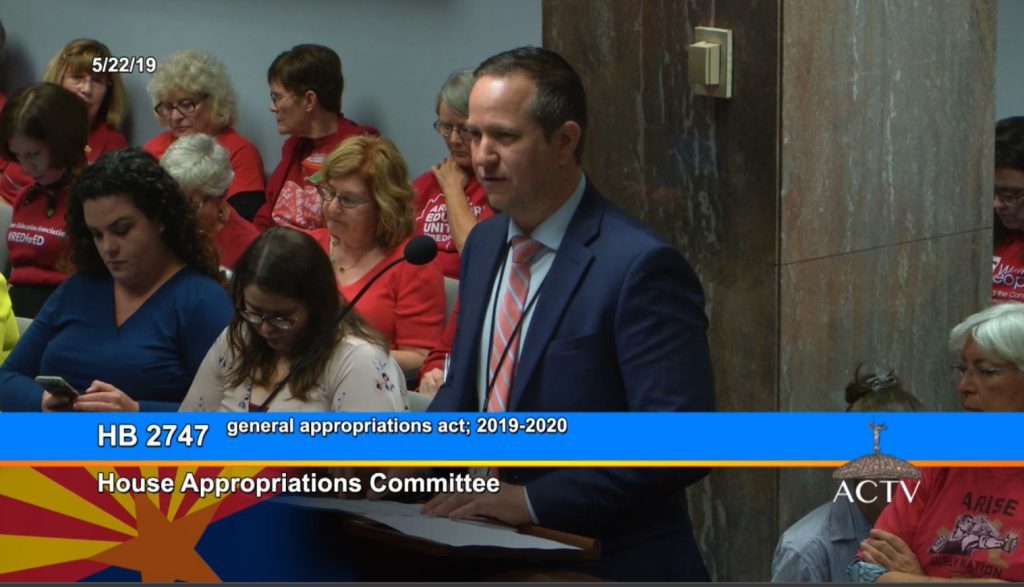
The budget bills are introduced in the House Appropriations Committee on May 22, 2019. Photo courtesy of Arizona Capitol Television.
“This is our future workforce. if not now, when? We’ve had enough. It’s time we start funding our school, with that I vote no,” Rep. Fernandez said.
“The money’s going to the school districts and not the classrooms where the money needs to go, and with that I vote an emphatic yes,” said Rep. John Fillmore.
Rep. Aaron Lieberman makes the case for fully funding our schools before we make these massive, unproven tax cuts. He’s been here fighting for students & teachers for over 9 hours straight! #RedForEd #BudgetWatch #AZ @aaron4az pic.twitter.com/ju95LQZfjj
— Kelli Butler (@KelliButlerAZ) May 23, 2019
“If we pass this budget it is over a half a billion for education this year, and with that I vote yes,” said Rep. Michelle Udall.
“We raised the rainy day fund and that means that when something happens like what did in 2008 happens again that we won’t have to make education cuts like we did then again,” said Rep. John Kavanaugh.
“There’s a lot of pro-education in this budget and I’m proud to vote yes,” said Rep. Kavanaugh.
This is infuriating. #RedForEd #AEABudgetWatch #Education #Arizona — attending AEA Budget Watch – Wednesday
— Jeanne Casteen (@JeanneCasteen) May 23, 2019
“We have over $200 million investing in the most vulnerable and our future,” said Rep. Regina Cobb. “The conformity package is part of that package to secure our future.”
“This is not a tax cut, this is giving the money back to the taxpayer,” Rep. Cobb said.
HB 2757 passed with 7 ayes 4 nays and 0 not voting.
The #AZSenate has already gone to RULES cmte (to hear 1 bill) and Caucus (to discuss several bad bills). We’re heading to the floor soon for Committee Of the Whole (“COW”) for debate/amendments on 3 bills. This is all subject to change quickly. #AEABudgetWatch #REDforED 2/
— Sen. Martín Quezada (@SenQuezada29) May 22, 2019
Rep. Regina Cobb said lawmakers plan to work late into the evening discussing the budget bills.
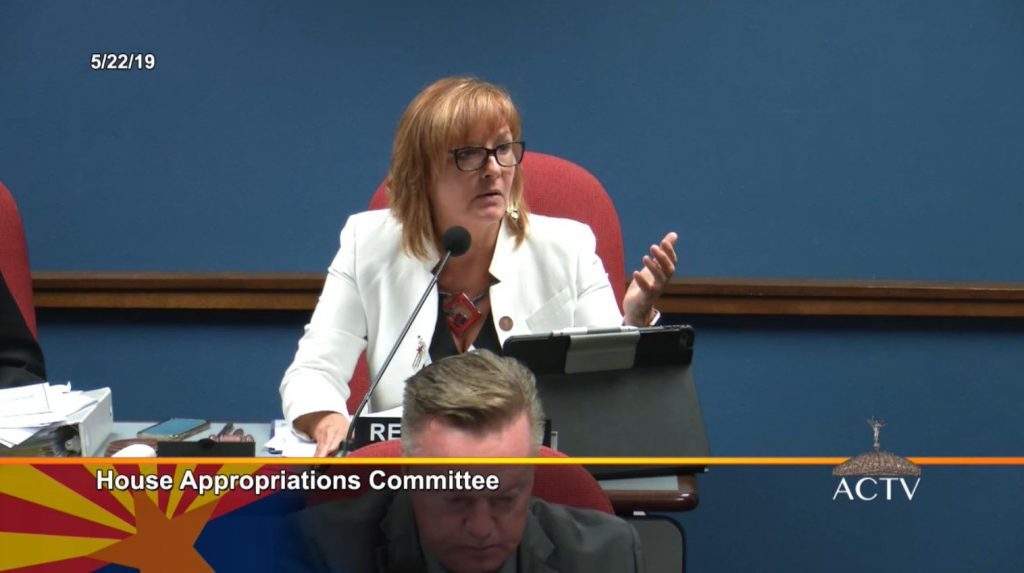
Rep. Regina Cobb said lawmakers plan to work into the evening discussing the budget bills. Photo courtesy Arizona Capitol Television
Republican lawmakers, including Rep. Ben Toma who led House negotiations on the tax breaks, defended those tax breaks on Tuesday “in the budget deal they made with Arizona Gov. Doug Ducey despite demands from teachers for an end to further revenue cuts until schools are fully funded,” according to an Associated Press article.
#azbudgetwatch Today is your only opportunity to give public comment on the budget.RTS on HB2747 – 2759.The only Committee hearing is Appropriations in House and Senate starting at 10am.
#KidsNotCuts #RedForEdhttps://t.co/ZbcwE6f9Dh
Bad process. Not enough transparency
— Mitzi Epstein (@MitziEpstein) May 22, 2019
The $11.9 billion budget proposal includes $386 million in cuts to fees and taxes, including more than $325 million in income tax cuts, which Rep. Toma told The Associated Press was an “offset, it’s not a tax cut. It’s an offset of a tax increase.”
We take a break from your regularly scheduled budget programming to inform you that ASBA was not consulted on #HB2032, did not sign off on #HB2032, and is ardently opposed to #HB2032. We now join our regularly scheduled program already in progress. https://t.co/j4v2D7LZfX
— ASBA Gov Relations (@azsba_GR) May 22, 2019
Rep. Toma noted that Arizona Legislators were restoring more K-12 public education funding.
Best news today is KidsCare in the budget! Health care for 35,000 children is #AZAwesome
— Deb Gullett (@debgullett) May 21, 2019
The K-12 Education bill, House Bill 2749, gives a pretty good picture of what the base level will be for next year, which is Fiscal Year 2020, said Chuck Essigs, governmental relations director for Arizona Association of School Business Officials.
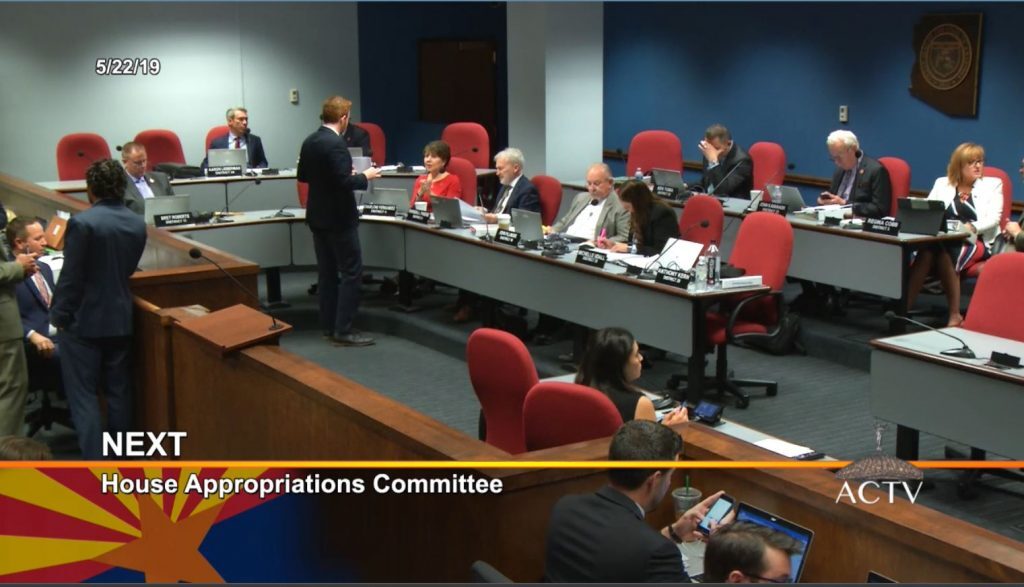
The House Appropriations Committee meets to discuss the budget bills on May 22, 2019. Photo courtesy Arizona Capitol Television.
The base level for next year in HB 2749, which includes the second year increase for the Governor’s 5 percent teacher salary increase and a 2 percent inflation factor increase, is set at $4150.43, and when teacher compensation is included that rises to $4,202.31, Essigs noted.
The budget proposal would also reduce the cuts to District Additional Assistance with all cuts eliminated by fiscal year 2023, Essigs said.
“The existing cut of $257,469,900 in FY 2019 would be reduced to $128,734,900 in FY 2020, the cut would stay at $128,743,900 in FY 2021, be reduced to $64,367,400 in FY 2022, and be eliminated in FY 2023,” Essigs said.
The restored dollars in district additional assistance for Fiscal Year 2020 would be up by $128.7 million, Essigs said.
“However, talk at the Legislature is that problems may exist in getting the proposed budget passed,” Essigs said.
Retired teachers at the Capitol watching the budget process said instead of tax breaks that reduce revenue streams, legislators should use that revenue to restore the cuts in education funding they made since 2008.
During the teacher walk-out last year, teachers said one of their demands was for no more tax cuts until education funding was restored to what it was before the recession in 2008.
This budget proposal will make students suffer from underfunded classrooms more than they already do, said Marisol Garcia, in an azfamily story.
Garcia is part of the #RedForEd movement and vice president of Arizona Education Association.
“What tends to happen is our legislators and governor continue to give tax cuts to places that aren’t needed, and so then when it comes time to fund schools, there is no money left over,” Garcia said in an azfamily story.
Finished yesterday with a large group of #RedForEd champions! Loved seeing more educators today coming to support our public schools.#StillRedForEd #AZLeg pic.twitter.com/tGHECJhWhw
— Rep. Athena Salman (@AthenaSalman) May 22, 2019
The budget deal being considered begins to address many important funding needs, said Christine M. Thompson, president and CEO of Expect More Arizona.
“We are pleased to see investments in all levels of education – early childhood, K-12 and postsecondary – to help improve outcomes for students and strengthen Arizona communities,” Thompson said.
“To be clear, we are disappointed that potential revenues from tax conformity are being left on the table. But we also recognize that even those dollars wouldn’t adequately fund the investment priorities outlined in the Roadmap for P-20 Education Funding to reach the Arizona Education Progress Meter goals.,” Thompson said.
“Put the FY20 budget to bed and get started on the hard work of identifying a new mix of sources to thoughtfully increase state revenue while maintaining a healthy business climate, including, but not limited to, discussions to raise property, sales, and income taxes,” Thompson said.
Tuesday May 21
Budget bills were introduced in the House and Senate late Tuesday, and Arizona Legislators will discuss them in committee and on the floor Wednesday morning.
.@AZHouseDems and @AZSenateDems are holding a closed door budget briefing from JLBC rn. They invited the media, like they do every year, but JLBC just kicked us out. #transparency
— Hank Stephenson (@hankdeanlight) May 22, 2019
The K-12 budget reconciliation bill (BRB) is HB2749 for those following along at home. https://t.co/skkDBs5qD1
— Chris Kotterman (@mrkotter) May 21, 2019
The House introduced its series of budget bills shortly before 4:45 p.m. then adjourned, and the Senate presented their budget bills around 5:15 p.m. then adjourned for the day.
#RedForEd see you at the Capitol tomorrow! https://t.co/qwAPXrjdau
— Rebecca McHood (@RebeccaforAZ) May 22, 2019
The Senate plans to be back on the floor at 9 a.m. tomorrow, and the House Appropriations Committee is scheduled to meet at 10 a.m. Wednesday.
We’re about to go to the #AZSenate floor to officially introduce the #Budget2019 bills. Here we go! #AEABudgetWatch #REDforED 10/ pic.twitter.com/jHFccSnYeO
— Sen. Martín Quezada (@SenQuezada29) May 22, 2019
Arizona School Boards Association staff is preparing a full summary and spreadsheet of the budget, and will send those details out Wednesday morning, said Leigh Jensen, governmental relations associate for ASBA.
What’s likely going to happen is both Senate and House will first read budget bills this afternoon/tonight, and the appropriations committees will hear them tomorrow. Negotiations will likely continue even as the bills are behing heard.
— Luige del Puerto (@ldelpuerto) May 21, 2019
There are two places to make budget changes – in committee and on the floor. GOP leaders will likely try their best to get this process moving along. They’ll seek momentum. Once that ball gets rolling, they won’t want to stop until it’s across the finish line.
— Luige del Puerto (@ldelpuerto) May 21, 2019
Assuming this budget gets done this week, legislators will wrap up their work for the year shortly thereafter. Nobody really wants to stick around for much longer, so they could adjourn sine die this week. And on that day … pic.twitter.com/j2E3wF7sKs
— Luige del Puerto (@ldelpuerto) May 22, 2019
The budget bills are (click on bills to link to the documents): HB 2747, HB 2748, HB 2749, HB 2750, HB 2751, HB 2752, HB 2753, HB 2754, HB 2755, and HB 2756.
President @FannKfann updates reporters @azcapmedia @jjcooper @rachelleingang @JMShumway pic.twitter.com/cUSNBnqxMo
— AZSenateRepublicans (@AZSenateGOP) May 22, 2019
The K-12 Education Budget Reconciliation Bill is House Bill 2749.
In the upper chamber, the rules committee just gave permission to introduce budget bills and we’re waiting for lawmakers to meander back to the floor to officially introduce them. https://t.co/jAeRdDP3Pv
— Julia Shumway (@JMShumway) May 21, 2019
It looks like the bills will go to committee on Wednesday.
Until the Senate figures out how to get 2 of the 4 Republicans who are public about their opposition, just pencil in that plan for Thursday, m’kay? https://t.co/9tOrjsdgX9
— Jim Small (@JimSmall) May 22, 2019
They’ve just called a RULES cmte mtg here in the #AZSenate for 4:15pm in the Republican Caucus Room. No agenda yet. Is it for permission to introduce budget bills? #AEABudgetWatch #Budget2019 5/
— Sen. Martín Quezada (@SenQuezada29) May 21, 2019
Details of the $11.9 billion proposed budget plan by Republican Legislative leaders who worked on the deal with Gov. Doug Ducey were released Monday evening.
.@APChristie reports that @dougducey, President @FannKfann and Speaker Bowers have reached a preliminary budget deal. But that deal still has to garner 16 Senate and 31 House votes… look for @PaulDBoyer, @KateMcGeeAZ and @HeatherCarterAZ to feature prominently.
— ASBA Gov Relations (@azsba_GR) May 20, 2019
For education, the budget proposal includes funds for the 5 percent teacher pay raise, $15 million for school counselors and police officers on campus, $25 million for school building repairs, an increase to $136 million to partially restore additional assistance funding that public schools use to pay for books, software, buses and other soft-capital needs.
The budget proposal also includes a $542 million deposit into the state’s rainy day fund and $325 million in tax breaks.
Budget update: I am still optimistic that we can pass a bipartisan budget this year. Conversations are ongoing – here is my latest update on where things stand this morning. #LD18 pic.twitter.com/0SIH8af3NR
— Sean Bowie (@seanbowie) May 21, 2019
Democratic Legislators have concerns about the budget proposal, and are against cutting taxes until K-12 public education funding is restored to pre-recession amounts.
When quality AZ educators are leaving in droves, schools are crumbling, & there’s not enough $ to buy paper & crayons for my kindergartners, you want to CUT TAXES AGAIN? Kids matter! Education matters!
Voters matter & we’re getting madder!@dougducey #RedForEd #RedForKids
— Jennifer Bennett Powers (@JenBenPowers) May 21, 2019
It is not clear if Republican Legislators, which hold a slim majority, have enough votes to pass the plan, according to an Associated Press article.
Especially since Republican Senators Paul Boyer, Heather Carter, J.D. Mesnard and Michelle Ugenti-Rita said they “would vote against the budget in its current form,” in an article in The Arizona Republic.
House lawmakers approved changes to the statute of limitations for survivors of sexual abuse, but would not allow #victims and their advocates to weigh in before the panel voted.https://t.co/lNAWqf2ug2
— KJZZ Phoenix (@kjzzphoenix) May 21, 2019
Gov. Ducey wanted the state to also keep the estimated $217 million increase in tax revenue from Arizona conforming to the 2017 changes in federal tax law, but Republican Legislators were against that idea and instead created a tax break package that added that amount to revenue from taxing online sales and savings from paying off state debt, according to the AP article.
@AZHouseDems put a state budget out that worked for everyone. It restored some K-12 funding, made significant investment in affordable housing, infrastructure and so much more. The “compromise budget” released yesterday gives out a $386M tax cut annually. Wrong direction! #azleg
— Rep Reginald Bolding (@reginaldbolding) May 21, 2019
The budget proposal would phase out the $32 vehicle license fee passed last session by reducing the fee to $26 next year, then to $20 the year after that, and further cut the fee by $5 each year until it is eliminated.
I just tried to make an appointment to see Rep.@michudall with a few other teachers from her LD and we were told that she wasn’t taking meetings this week. It’s the last week of the semester for us, but you better believe we’re still meeting with students. #AZbudget #RedforEd
— Amber Gould (@Amber4Education) May 20, 2019
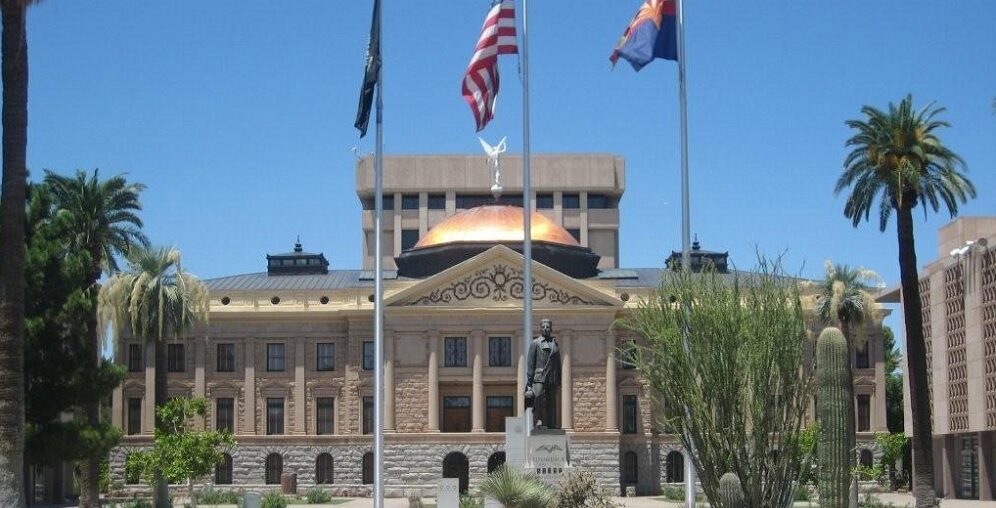
The Arizona Legislature in Phoenix
Monday, May 20, 2019
Republican leaders in the Arizona House of Representatives and Senate shared details of the budget bills with GOP lawmakers this morning and this afternoon.
#AZLeg proposed budget contains $386 million permanent tax cut at a time when public schools, community colleges and universities have less funding than a decade ago.
— David Lujan (@DavidLujan) May 20, 2019
On Sunday, Senate President Karen Fann said that Republican leaders in the Arizona Legislature have reached a budget deal with Gov. Doug Ducey, and she and House Speaker Rusty Bowers will present on Monday, according to an Associated Press article.
Republican leaders in House and Senate reach budget deal with Arizona governor (from @AP) https://t.co/yVEepTKSNn
— Bob Christie (@APChristie) May 19, 2019
Meanwhile, #RedForEd leaders are encouraging teachers to come to the Capitol after school this week to meet with legislators and sit in the galleries during the budget process.
I’m attending an @arizonaea #AEABudgetWatch at the capitol. RSVP here: https://t.co/S41TqB5xm6
— Noelle Griffin 🍎 (@noeygriff) May 20, 2019
Wait. What? $300M tax cuts when AZ schools are SO desperately underfunded??? #RedForEd calls BS! Find an action by you this Wednesday. Call and email your reps and Governor Doug Ducey now and every day. They need to know we’re watching them!
Governor Ducey – Tucson: 520.628.6580— andrea rickard (@draya3) May 19, 2019
At 3 p.m. today, Democratic legislators, who were not included in budget negotiations between Gov. Doug Ducey and Legislative Republican leadership, presented their budget during a press conference.
Democrats’ proposal for the budget focuses on the critical issues:👩🏽🏫Funding Public Education⚕️Protecting Access to Healthcare🛣️Rebuilding our Infrastructure🏘️Housing the Homeless
☔️Growing our Rainy Day Fund
We hope to work together to move the needle for Arizona residents.
— Charlene Fernandez (@CharleneforAZ) May 20, 2019
Sen Alston referring to the Republican budget, “Arizona does not need another massive tax cut!” “We need money for schools and locks in our prisons.” R budget has over $380 mill in new tax cuts. @AZHouseDems pic.twitter.com/RJ1qaGN7wM
— Kirsten Engel (@EngelForArizona) May 20, 2019
3PM TOMORROW: Senate Democrats will share their responsible budget that serves the needs of #AZ and our efforts to negotiate in bipartisanship with @AZSenateGOP and @dougducey. pic.twitter.com/iM7ZN0T9E6
— Arizona Senate Dems (@AZSenateDems) May 20, 2019
Republicans hold a 31-29 majority in the House, which means they need every GOP vote to pass a budget without Democratic support.
Everyday more people in red show up in the gallery.#StillRedForEd #AZLeg #RedForEd pic.twitter.com/FDufPileAV
— Rep. Athena Salman (@AthenaSalman) May 20, 2019
The Senate has a 17-13 GOP majority, but several members say they won’t vote for a budget unless their concerns are resolved.
House Rules Committee meeting now to allow for late introduction of bills, including budget and expected #ESA “fix,” as well as clear #HB2746, relating to sexual assault victims and the annual technical corrections bill, SB1220. 1/— ASBA Gov Relations (@azsba_GR) May 20, 2019
“Sen. Michelle Ugenti-Rita has said she wants the vehicle license fee cut. Sens. Paul Boyer and Heather Carter want an extension to the statute of limitations allowing child sex assault victims to sue or they won’t sign off,” according to the AP article.
At 11 a.m., a presentation about the Statute of Limitations was scheduled on the Senate Lawn.
Advocates say they are perplexed as to why House and Senate leaders seem bent on protecting institutions instead of people who have endured some of life’s worst cruelties.https://t.co/DveF2wHeJM
— PhoenixNewTimes (@phoenixnewtimes) May 20, 2019
Using #ESAs for Out of state private schools? It’s bad enough using AZ public funds for private schools but using AZ public funds for out of state schools? C’mon @RickGray this is just wrong. @dougducey #AwHellNah #NoMeansNo #NoESA #Misuse https://t.co/i8JVtE2Kby
— Beth Simek (@andzmomaz) May 19, 2019
Thursday, May 16, 2019
The Arizona House of Representatives and Arizona Senate heard and voted on bills today, then adjourned until Monday morning when Senate and House leaders plan to introduce budget bills.
House and Senate Republicans plan to introduce their budget bills Monday, Senate President Karen Fann and House Speaker Rusty Bowers said. story by @JMShumway
and @_KECampbellhttps://t.co/RfmmJV5iVF— AZ Capitol Times (@AzCapitolTimes) May 16, 2019
Republican leaders said Thursday they hope to finalize a budget deal with Gov. Doug Ducey over the weekend and roll out the plan early next week, according to an Associated Press article.
🚨#AEABudgetWatch🚨
Senate has adjourned until Monday 5/20. House is currently in recess, Rules will meet this afternoon for late introduction of bills but not budget bills. We expect House to adjourn this afternoon until Mon as well. Thx @AEARetired for reppin’ this week! 1/ pic.twitter.com/MwGQhfAItR— Stephanie Parra (@StephParra08) May 16, 2019
Several Republican senators said they planned to vote against any budget that doesn’t address their key issues, “including repealing a $32 vehicle registration fee and extending the statute of limitations for child victims of sexual abuse to sue their assailants,” according to an Arizona Capitol Times article.
HB2746 has dropped, and it looks like it gives @PaulDBoyer just about everything he wanted. Childhood sex abuse victims would have 12 years after they turn 18 to file civil suits against individuals or organizations. https://t.co/M05O6XoUWu https://t.co/RCr8DVSJg0
— Jeremy Duda (@jeremyduda) May 16, 2019
“We are hoping that we can get this done next week,” said Senate President Karen Fann in The Associated Press article. “So depending on how everybody cooperates, and if we get everything done then that’s the preferred plan. But if it stalls we could go another week or two if we don’t get the votes.”
The #AZSenate heads to the floor at 10am. All we have is a short 3rd Read and a short Final Read calendar (recorded votes). Nothing re: budget yet. Watch live here: https://t.co/KvrCjOqdPv
#AEABudgetWatch #REDforEd #BudgetWatch #Budget2019 1/— Sen. Martín Quezada (@SenQuezada29) May 16, 2019
Yesterday, a House motion was approved that suspended a rule that lets House members introduce budget bills.
These figures are wildly out of context, and are designed to make you think GOP legislators have actually funded our K-12 system.
They haven’t.
Adjusted for inflation, K-12 gets $31 more now than in 2001.https://t.co/S1udsJEmyG https://t.co/0Bia5NUzyr
— Jim Small (@JimSmall) May 16, 2019
Leaders in the Senate and House met until 9:30 p.m. Wednesday night to work on details of their budget bills and more meetings are planned today.
Here is the rest of the graph and context … you know, the one where inflation is factored in and we don’t just show misleading nominal variables and we show real variables. Can @KimberlyYeeAZ and the @AZTreasury please help @BretRbrts and the @AZHouseGOP out with inflation? pic.twitter.com/XgY7MI9eCm
— Neal Barnett (@NealBarnett7) May 16, 2019
House Speaker Rusty Bowers said he thinks “there could be substantive progress on Monday” to The Associated Press.
The potential for red-clad teachers again descending on the Capitol could motivate legislators to wrap up budget negotiations before school is out for summer. via @ben_giles
and @_KECampbellhttps://t.co/7DpptW0FrU— AZ Capitol Times (@AzCapitolTimes) May 16, 2019
But Bowers did not say whether Republican leaders reached agreement on tax conformity, the rainy day fund and the vehicle license fee with Gov. Ducey but hinted that they had reached agreement on some of those issues, according to an Arizona Capitol Times article.
FOR IMMEDIATE RELEASE: Legislative District 11 Legislators Release Statement on Tax Conformity#AZSenate #AZHouse #TaxConformity @AZHouseGOP pic.twitter.com/F0ONuCtZvN
— AZSenateRepublicans (@AZSenateGOP) May 16, 2019
Thanks for the focus on this! Schools all have different needs and can perform threat assessments that are specific to their district! https://t.co/EB48EJ0tcF
— Jill Norgaard (@JillNorgaard) May 16, 2019
House Democrats hope to see some of their ideas, including a full restoration of district and charter additional assistance included in the budget bills, said Rep. Aaron Lieberman in the video posted on Twitter below.
Quick update from the Capitol ⬇️ #BudgetWatch #AZLeg @aaron4az pic.twitter.com/Hn8P6cQKQo
— Kelli Butler (@KelliButlerAZ) May 16, 2019
“We look forward to working on the budget and making sure our priorities are reflected in the final product,” said Rep. Kelli Butler in the Twitter video above.
#RedForEd on #BudgetWatch! Great to see public education supporters at the Capitol every day! ❤️ #WeAreNotDone #AZLeg pic.twitter.com/nnBp45z6Ef
— Kelli Butler (@KelliButlerAZ) May 16, 2019
I am proud stand with a Senate Democratic Caucus that is united in our values and for the greater good. #NoSellouts https://t.co/1UM5SGrb9Z
— Rebecca Rios (@Rios_Rebecca) May 16, 2019
Wednesday, May 15, 2019
The House suspended House Rule 8C at 10:45 a.m. Wednesday morning to allow Speaker of the House Rusty Bowers, Rep. Ben Toma and Rep. Regina Cobb to sponsor legislative measures relating to the budget, then adjourned until 10 a.m. Thursday morning.
House Republicans just made a motion to suspend the rules for late introduction of budget bills. Translation: Something might be happening soon. #RedForEd & other constituents and organizations, please make sure your legislators know your priorities! #Azleg pic.twitter.com/w0OfPSAjmZ
— Arizona House Democrats (@AZHouseDems) May 15, 2019
I and @reginaldbolding will be holding an open meeting about the budget and our priorities. Please join us at the House of Representatives tonight 530-700pm hearing room 4!
— Diego Rodriguez (@Diego4Justice) May 15, 2019
House Rule 8C relates to the seven-bill limit for introduction of bills, resolutions and memorials.
❗️ #AZLeg pic.twitter.com/0MH2w2XDc0
— Katie Campbell (@_KECampbell) May 15, 2019
House Majority Leader Petersen called for the House to consider budget bills, and after the motion was approved, House Speaker Bowers asked for the Senate to be notified.
Worth noting that this is a procedural requirement, and is not indicative that the #AZLeg is ready or prepared to actually approve a budget right now.
By all accounts, there is no budget deal on the immediate horizon. https://t.co/dFzLs4xHMS
— Jim Small (@JimSmall) May 15, 2019
An AZ Mirror article said the motion doesn’t mean that a budget deal is near.
“However, GOP lawmakers say they’ve largely overcome one of the biggest stumbling blocks: the dispute over how to conform Arizona’s income tax laws with the federal tax code. Cobb, R-Kingman, said that leaves the size of the state’s rainy day fund as the largest unresolved issue standing in the way of a budget deal,” according to the AZ Mirror article.
House Republicans say the fight over tax conformity is largely resolved, but the rainy day fund still stands in the way of a budget deal with @dougducey https://t.co/HB63a5kQmJ
— Jeremy Duda (@jeremyduda) May 15, 2019
During the House session, Rep. Aaron Lieberman read a note he received from a Peoria Unified School District English and Honors teacher “as we all get ready to do our work on the budget.”
.@aaron4az reads a teacher’s heartfelt statement about underfunded classrooms in #AZ. As we move closer to voting on the budget we must prioritize additional education funding! #LD28 #RedforEd pic.twitter.com/fupXwJqE8I
— Kelli Butler (@KelliButlerAZ) May 15, 2019
“We need less than 37 students to a class in a room built for 25. We have six counselors and only one psychologist for around 2,500 students. We have only 40 copies of A Midsummer Night’s Dream when 72 students need their own copy. We have only 33 laptops for a class of 37,” said Rep. Lieberman as he read from the note the teacher wrote.
“Our support staff and secretaries and bus drivers and cafeteria staff and paraprofessionals need a living wage,” the teacher continued.
“School restrooms have shoddy plumbing so the toilets don’t always flush and the sinks won’t drain. Some sinks have faucets that don’t turn off and we have broken washing machines in our severe special education student areas where they need to do laundry every day. The restrooms run out of soap before the year is out, and don’t get me started on the bug problem,” the teacher wrote.
“Students need tables and chairs not desks. Some of my students even though they’re freshman over six feet tall and over 250 pounds can’t fit in those little desks,” Rep. Lieberman read from the teacher’s note.
“Some of our doors won’t open for handicapped students since the push plates are broken so they have to wait for someone to open the door for them,” the teacher said in the note.
“Students need adequate funding so they don’t have to do so many fundraisers. We have five different fundraisers going on right now and it’s teachers and parents who do most of the donating,” Rep. Lieberman said as he read the teacher’s note.
Today I read a note on the floor that was part of a package we received from teachers across the state.This teacher wrote how they need smaller class sizes, more counselors, and lots of repairs. I hope we can all come together on a budget to help our schools address these needs! pic.twitter.com/bbvcfMtQ0M
— Aaron Lieberman (@aaron4az) May 15, 2019
After finishing reading the teachers note, Rep. Lieberman said, “I think this is about our 118th day and I surely hope we can do more for our public schools.”
NOW is the time to fix the crisis, fund our schools, and do it now. #AZLeg https://t.co/O4kiOSDFVO
— Rebecca Garelli (@RebeccaGarelli) May 15, 2019
Rep. Lieberman said he represents the single highest income ZIP code in the State of Arizona – 85253 and added that “I have received numerous comments and emails from constituents around their concerns for our public school funding. I’ve yet to hear from a single constituent about their concerns about our tax rate. With that, I urge all of our members to look inward and see what we can do for our schools as we get ready to go into the budget.”
Ok teachers. Roll call. Tweet us pics of what needs to be fixed at your school! @ArizonaEA https://t.co/NFxMI3T1Ju
— Aaron Lieberman (@aaron4az) May 15, 2019
After voting on bills, Sen. Rick Gray moved that the Senate be adjourned until Thursday, May 16 at 10 a.m. The motion was approved at 11:11 a.m. and the Senate adjourned for the day.
As we come closer to possible movement on our state budget, I’ll provide updates for anyone who wants a simple explanation of what’s going on. As of today, no news. The #AZSenate doesn’t appear to have reached a deal yet and we’ve adjourned for the day. #AEABudgetWatch #REDforED
— Sen. Martín Quezada (@SenQuezada29) May 15, 2019
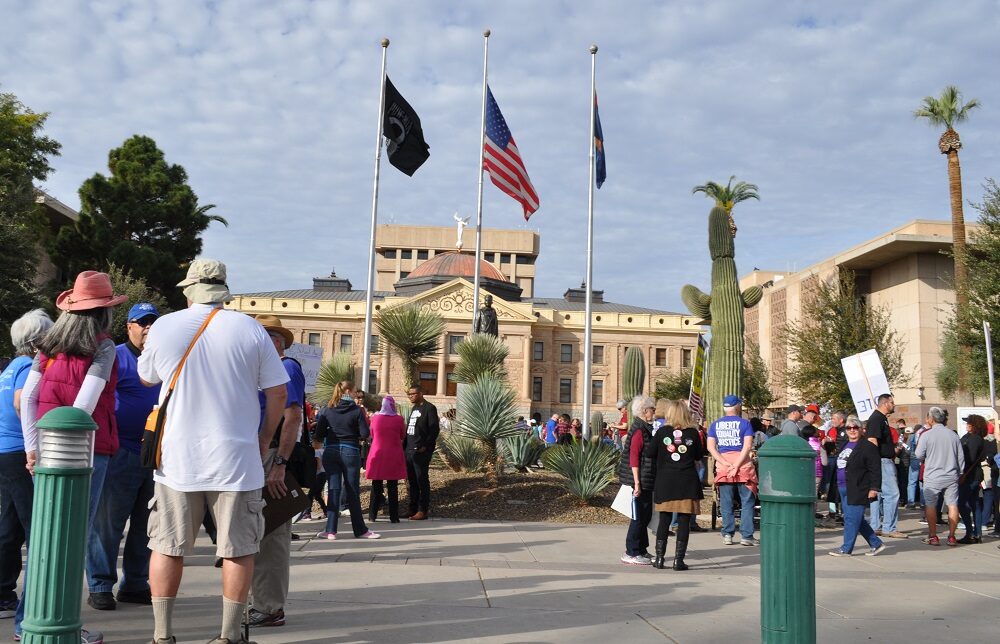
The March to Save Our Schools and Support Public Education on Sautrday, Jan. 6, 2018 at the Arizona Capitol.








